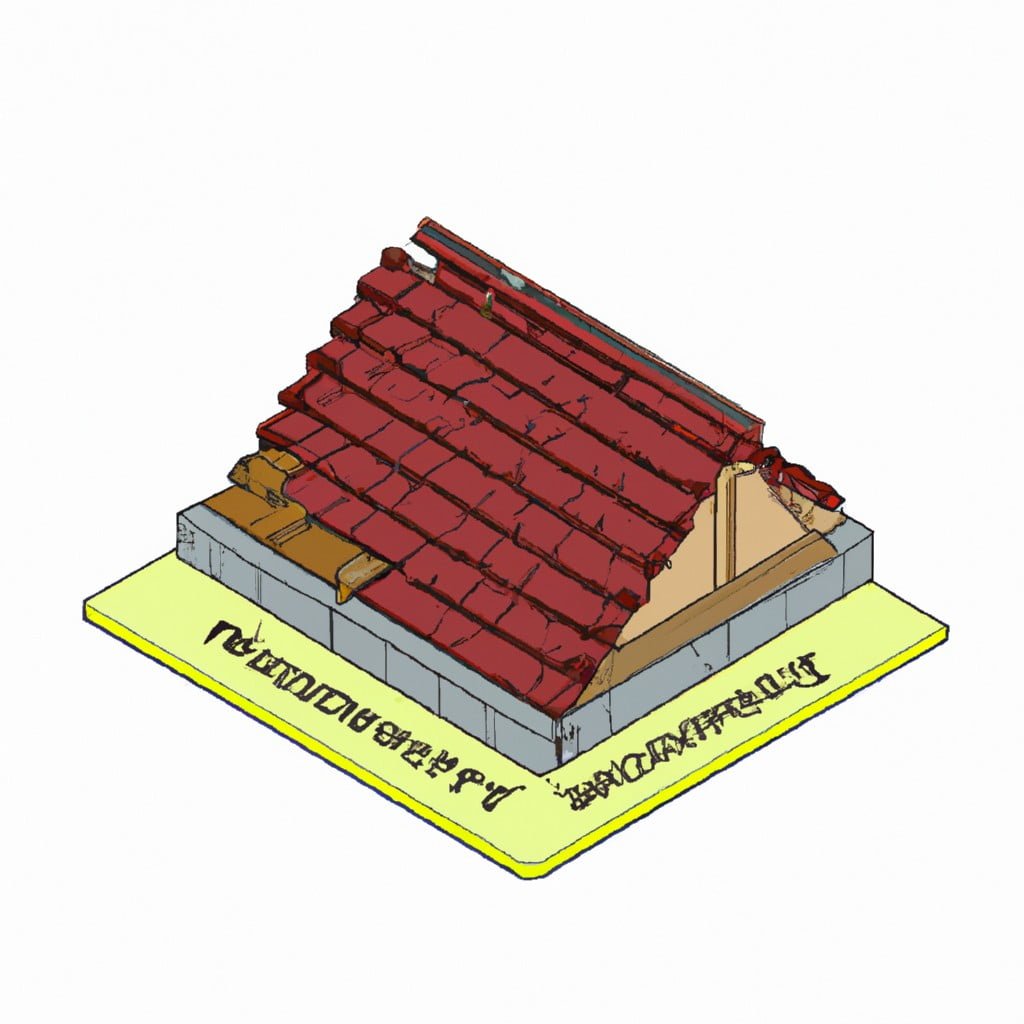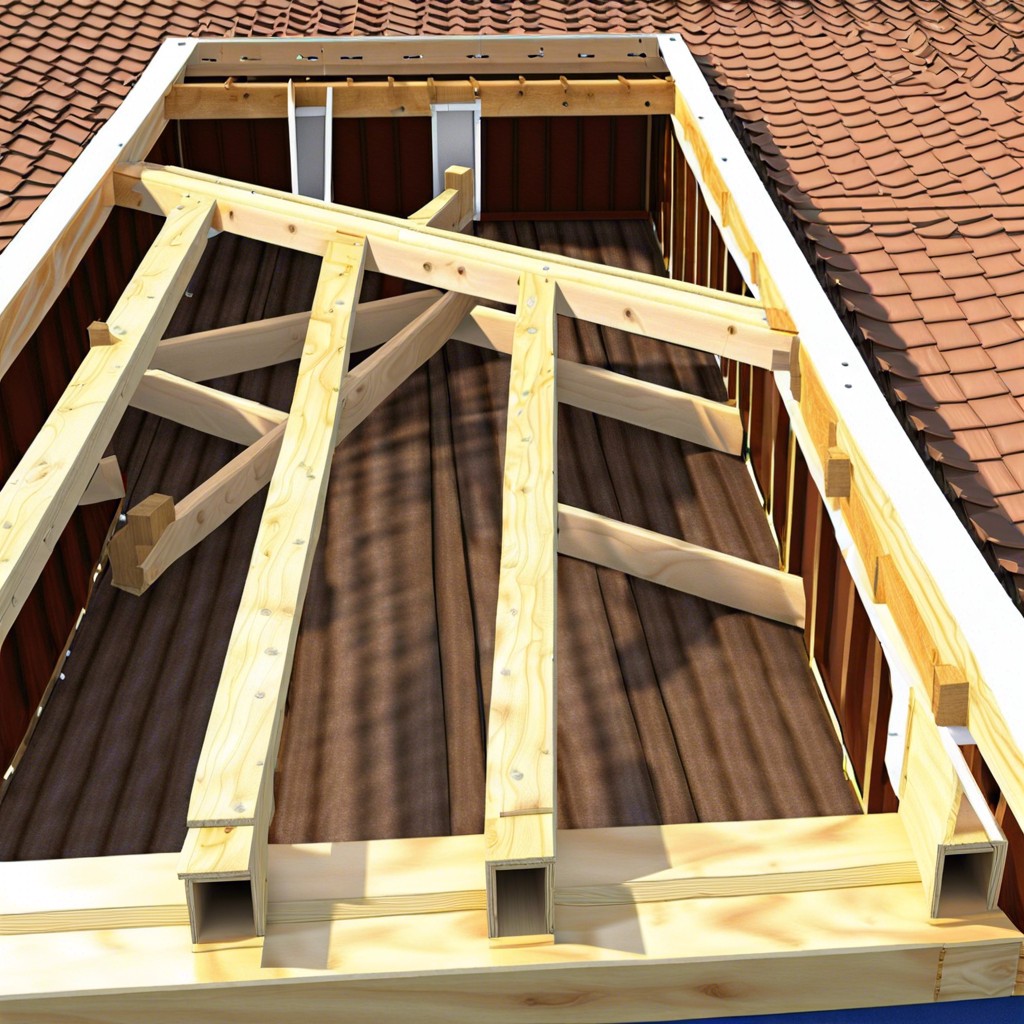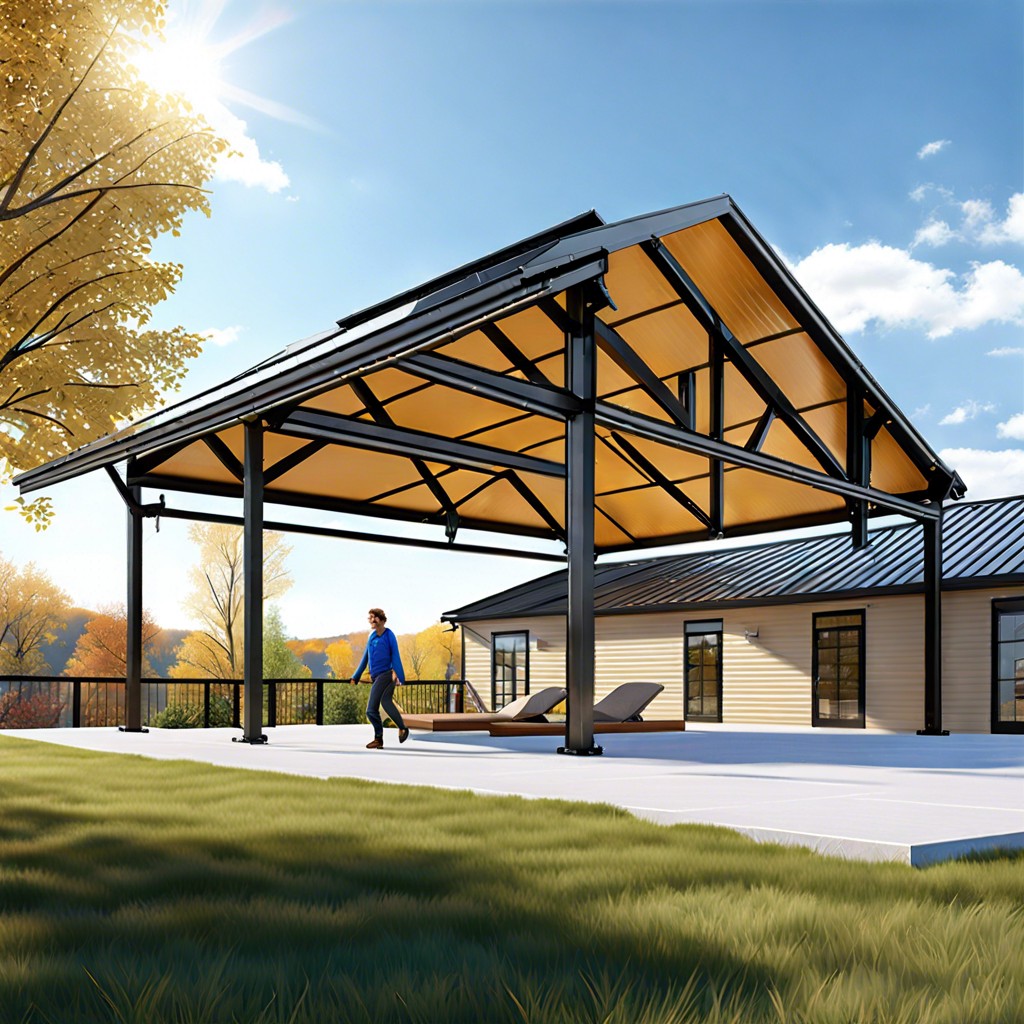Last updated on
Discover how solar panels may impact your roof warranty and what you need to know before installation in this informative blog post.
Are you considering installing solar panels on your roof but worried about the impact it may have on your roof warranty? You’re not alone. Many homeowners are hesitant to make the switch to solar because they fear it could void their roofing warranty.
But is this really the case? In this article, we’ll explore whether or not solar panels can void your roof warranty and what you need to know before making a decision. So, if you’re curious about how solar panels and roofing warranties intersect, keep reading!
Solar Panels and Roof Warranties

When it comes to installing solar panels on your roof, one of the biggest concerns for homeowners is whether or not it will void their roofing warranty. The good news is that in most cases, adding solar panels to your roof won’t automatically void your warranty.
However, there are some important factors you need to consider before installation.
Firstly, it’s essential to understand what type of roofing warranty you have and what factors can impact its validity. There are two main types of warranties: manufacturer warranties and workmanship warranties.
Manufacturer warranties cover defects in the materials used for the roof while workmanship warranties cover issues related to how well the installation was done.
It’s also important to note that many roofing manufacturers have specific guidelines regarding solar panel installations on their products. These guidelines may include requirements such as using a specific racking system or ensuring proper ventilation around the panels.
Types of Roof Warranties
Manufacturer’s warranties cover defects in the materials used for your roof, while workmanship or installation warranty covers issues that arise from improper installation of the roof.
It is important to note that not all roofing manufacturers offer a warranty on their products. However, if they do provide one, it typically lasts between 20-50 years depending on the type of material used for your roof.
Workmanship or installation warranty is provided by contractors who install your new roof. This type of guarantee usually lasts between 1-10 years and covers any problems caused by poor craftsmanship during installation.
Before installing solar panels on your rooftop, you should carefully review both types of guarantees offered with regards to their terms and conditions as well as exclusions related to solar panel installations. Some manufacturers may void their product’s warranty if you install anything onto them without prior approval from them; this includes solar panels which can be heavy enough (depending upon size)to cause damage over time due to weight distribution issues.
Factors Affecting Roof Warranties
One of the most significant factors is age. If your roof is nearing the end of its lifespan, adding solar panels could void any remaining warranty coverage.
Another factor to consider is whether or not you’ve made any modifications to your roof in the past. Some warranties may be voided if you’ve already installed additional features like skylights or vents.
Some roofing materials are more compatible with solar panel installations than others. For example, asphalt shingles and metal roofs tend to work well with most types of racking systems used for mounting solar panels.
It’s also worth noting that different manufacturers have varying requirements when it comes to installing solar panels on their products without voiding a warranty. Be sure to check with both your roofing manufacturer and potential installer before making a decision about going green with rooftop energy production.
Roofing Material Compatibility With Solar Panels
Not all roofing materials are created equal, and some may not be suitable for supporting solar panel installations.
For example, if you have an older roof made from asphalt shingles that are nearing the end of their lifespan, it may not be a good idea to install solar panels until you’ve replaced your roof. This is because old or damaged shingles can compromise the integrity of both your roof and any installed equipment.
On the other hand, newer roofs made from metal or tile tend to be more compatible with solar panel installations due to their durability and strength. However, it’s still important to consult with a professional installer who can assess whether or not your specific type of roofing material will work well with a new installation.
Ensuring Solar Panels Do Not Void Your Roof Warranty
The good news is that there are steps you can take to protect your roofing warranty while still enjoying the benefits of solar energy.
First and foremost, it’s crucial to work with a certified and experienced solar installer who understands the importance of protecting your roof. They should be able to provide documentation showing they have liability insurance coverage for any damage caused during installation.
Make sure the installer uses proper mounting equipment designed specifically for use with your type of roofing material. This will help prevent damage from occurring during installation or removal in case repairs need to be made in the future.
It’s also essential not only to follow manufacturer guidelines but also local building codes when installing solar panels on a rooftop. These regulations may vary depending on where you live and could impact whether or not an installation is considered compliant under certain circumstances.
Installing Solar Panels Correctly
Not only does this ensure that your solar panels function correctly and efficiently, but it also helps protect the integrity of your roof and any warranties associated with it.
To install solar panels correctly, you’ll need to work with a certified installer who has experience working with both roofing systems and photovoltaic (PV) systems. They will be able to assess the condition of your roof before installation and determine if any repairs or reinforcements are needed.
During installation, they will take care not to damage the roofing material or compromise its waterproofing capabilities. This includes using appropriate mounting hardware that won’t penetrate too deeply into the roofing material or cause leaks.
They should follow all manufacturer guidelines for spacing between rows of PV modules as well as ensuring adequate ventilation beneath them. Proper ventilation can help prevent heat buildup which can lead to premature aging of both roofs and PV modules alike.
Manufacturer’s Warranty Considerations
While some homeowners may assume that installing solar panels automatically voids their roofing warranty, this isn’t always the case. In fact, many manufacturers offer warranties that are specifically designed to accommodate solar panel installations.
Before you install solar panels on your roof, be sure to check with both your roofing manufacturer and your chosen solar installer about any potential conflicts or issues. Some manufacturers may require specific types of flashing or underlayment materials in order for their warranties to remain valid when paired with a rooftop PV system.
It’s also worth noting that some roofing companies have partnerships with certain PV installers and can provide guidance on which systems are compatible with their products while still maintaining coverage under the original warranty agreement.
Ultimately, understanding all aspects of both your roof and PV system warranties is crucial before making any decisions regarding installation.
Common Roof Warranty Exclusions
These exclusions can vary depending on the manufacturer and type of warranty you have, but some of the most common ones include:.
- Damage caused by natural disasters such as hurricanes or earthquakes
- Neglect or improper maintenance
- Installation errors made by contractors not certified by the roofing manufacturer
- Alterations made to your roof without prior approval from your roofing contractor
- Failure to properly ventilate your attic space
It’s important to note that many manufacturers will also exclude damage caused by solar panel installation if it is not done correctly or with their approved methods.
To ensure that you don’t accidentally void your warranty when installing solar panels on your roof, make sure you read through all warranty documents carefully and consult with a professional installer who is familiar with both roofing and solar panel installations.
Impact of Solar Panel Weight On Roofs
While solar panels are designed to be lightweight, they can still add a significant amount of weight to your roof. This added weight can put stress on your roofing system and potentially cause damage if not installed correctly.
It’s important to note that different types of roofs have different weight capacities, so it’s crucial that you consult with a professional before installing solar panels. A certified installer will assess the structural integrity of your roof and determine if any reinforcements need to be made before installation.
Proper racking systems must be used during installation as these help distribute the load evenly across the surface area rather than concentrating all in one spot which could lead to sagging or even collapse over time.
Ensuring Proper Roof Ventilation
Without proper ventilation, heat can build up in the attic space, causing damage to both the roof and solar panels. This can lead to premature aging of shingles or even cause them to crack or curl.
To avoid these issues, it’s important that you have adequate ventilation installed before installing solar panels on your roof. A professional installer will be able to assess whether there is enough airflow in your attic space and recommend any necessary upgrades.
There are several types of vents available for roofs including ridge vents, soffit vents, gable-end vents among others which all work together as a system providing continuous air flow through the attic area keeping it cool during hot weather conditions while also preventing moisture buildup during cold seasons.
Solar Panel Removal and Reinstallation
Perhaps your roof needs repairs or replacement, or maybe you’re moving and want to take your solar panels with you. Whatever the reason, it’s important to understand how removing and reinstalling solar panels can impact your roof warranty.
If not done correctly, removing and reinstalling solar panels can cause damage to the roofing material underneath. This could potentially void any remaining warranty on that portion of the roof.
To avoid this issue, it’s crucial that a certified professional handles both removal and reinstallation.
When hiring an installer for this job make sure they have experience in handling such situations as well as proper insurance coverage in case anything goes wrong during installation or removal process. Additionally ensure that all necessary permits are obtained before starting work on either end so everything is up-to-code from start-to-finish!
Hiring a Certified Solar Installer
Not only will they ensure that the installation process goes smoothly, but they’ll also be able to advise you on how best to protect your roof warranty. A certified installer will have the necessary training and experience needed to install solar panels without damaging your roofing material or structure.
Before hiring an installer, make sure that they are licensed and insured in accordance with state regulations. You can also check their certifications through organizations such as the North American Board of Certified Energy Practitioners (NABCEP) or Solar Energy Industries Association (SEIA).
These organizations provide rigorous training programs for installers and require them to pass exams before becoming certified.
Regular Roof Inspections and Maintenance
A well-maintained roof can last longer, which means you’ll be less likely to run into issues with your roofing warranty.
Roof inspections should be conducted at least once a year, but it’s recommended that you have them done twice a year if possible. During these inspections, a professional roofer will check for any signs of damage or wear and tear on your roof.
They’ll also look for any potential problems that could arise in the future.
If they find anything concerning during their inspection, they can make repairs before it becomes an issue down the line. This proactive approach not only helps keep your home safe from leaks but also ensures that you’re doing everything possible to maintain compliance with your roofing warranty requirements.
In addition to regular inspections, proper maintenance is crucial in keeping both solar panels and roofs functioning optimally over time. Regular cleaning of debris such as leaves or branches off rooftops prevents water buildup which may cause damage over time.
Roof Warranty Transferability and Changes
What happens if you decide to sell your home? Will the new owners be able to take advantage of any remaining warranty coverage on both the roof and solar panels? The answer is yes, but with some caveats.
Most roofing warranties are transferable, meaning that they can be passed along from one homeowner to another. However, there may be certain conditions or fees associated with transferring a warranty.
It’s essential that you read through all of the fine print in your roofing warranty contract before making any decisions regarding selling or transferring ownership of your home.
In addition to understanding how a change in homeownership could impact your roof warranty coverage, it’s also crucial that you consider how adding solar panels may affect this process as well. Some manufacturers offer separate warranties for their solar products which may have different terms and conditions than those offered for traditional roofing materials.
Understanding Your Solar Warranty
You also need to understand the terms of your solar panel warranty. Most reputable solar panel manufacturers offer warranties that cover defects in materials and workmanship for a certain number of years.
It’s important to read through the details of your solar panel warranty carefully so you know what is covered and what isn’t. For example, some warranties may only cover repairs or replacements if the panels fail due to manufacturing defects, while others may include coverage for damage caused by extreme weather events.
Make sure you understand how long your solar panel warranty lasts and whether or not it can be transferred if you sell your home. Some warranties are transferable but require additional paperwork or fees.
What Situations Will Void Roof Warranty?
While the specifics may vary depending on the manufacturer and type of warranty you have, here are some common scenarios that could result in a voided warranty:.
- Failure to properly maintain your roof
- Using incompatible roofing materials or installation methods
- Making modifications or repairs without prior approval from the manufacturer
- Failing to address leaks or other issues in a timely manner
- Neglecting proper ventilation and insulation
- Exceeding weight limits with added structures like solar panels
It’s important to note that installing solar panels does not automatically void your roof warranty; however, if they’re installed improperly or cause damage due to excess weight, it could impact your coverage.
To ensure you don’t accidentally violate any terms of your roofing warranty when installing solar panels, be sure to consult with both the panel installer and roofing manufacturer beforehand for guidance on compatibility and installation requirements.
Dealing With Voided Roof Warranty
There are still steps you can take to protect your home and ensure that any future roofing issues are covered.
Firstly, it’s important to understand why the warranty was voided. Was it due to improper installation of the solar panels or because they were not compatible with your roofing material? Once you know the reason for the voided warranty, you can work on finding a solution.
In some cases, it may be possible to negotiate with your roofing manufacturer or installer and come up with an agreement that will reinstate coverage. This could involve making modifications or repairs as necessary so that both parties feel confident in their ability to honor their warranties moving forward.
Alternatively, if negotiations fail and there is no way around having a voided roof warranty due to solar panel installation, consider investing in additional insurance coverage specifically for this purpose. While this won’t replace all of the benefits of having a valid roof warranty from your manufacturer or installer directly – such as free repairs – it will provide peace of mind knowing that any potential damage caused by faulty installations is covered under an insurance policy.
Racking Systems
They provide a secure and stable platform for the panels to rest on, ensuring they remain in place even during extreme weather conditions. However, not all racking systems are created equal, and some may have a negative impact on your roof warranty.
When choosing a racking system for your solar panels, it’s important to consider its compatibility with your roofing material. Some materials may require specific types of racks or mounting hardware that can affect the integrity of the roof structure if not installed correctly.
Poorly designed or installed racking systems can cause damage to roofs over time due to excessive weight or improper attachment methods. This could lead to leaks and other issues that would void any existing warranties you have in place.
To avoid these problems when installing solar panels on your roof, make sure you work with certified professionals who understand how different types of roofing materials interact with various rack designs. They will be able to recommend appropriate solutions that won’t compromise either the performance of your solar system or the longevity of your roof warranty.
Check Before You Begin
Some manufacturers may have specific guidelines for installing solar panels that must be followed in order to maintain the validity of their warranty. Some installers may offer a separate warranty for the installation itself.
It’s also crucial to ensure that your roof is in good condition before adding any additional weight from solar panels. A damaged or weakened roof can compromise both its structural integrity and its ability to support added weight from solar panel installations.
By checking with both your roofing manufacturer and installer beforehand, you can avoid any potential issues down the line regarding voided warranties or damage caused by improper installation practices.
Protect Your Roof: Choose Professional Solar Installation
Not only will they ensure that the installation is done correctly and safely, but they can also help protect your roof warranty. Professional installers are trained to properly assess your roofing system’s compatibility with solar panels and make any necessary adjustments or repairs before installation.
Many reputable solar companies offer warranties for their installations that cover both the equipment and labor in case of any issues down the line. This added protection can give homeowners peace of mind knowing that their investment is secure.
It’s important to do thorough research when selecting a solar installer for your home. Look for companies with experience in both roofing and solar panel installations, as well as positive reviews from previous customers.
By choosing a professional installer who understands how to properly install solar panels without voiding your roof warranty, you can enjoy all the benefits of renewable energy while protecting one of your home’s most valuable assets – its roof!.
FAQ
Do solar panels cancel roof warranty?
Generally, solar panels do not void a roof warranty, but improper installation by some companies may lead to issues.
What happens when your roof leaks and you have solar panels?
When your roof leaks with solar panels installed, workers must remove the solar array to repair the roof, which results in added expenses for homeowners.
Do solar panels compromise the roof?
Solar panels may cause roofing materials to deteriorate faster and create an extra load on the cooling system, but if installed and maintained properly, they should not damage the roof.
What voids solar warranty?
Solar warranties can be voided by DIY installations, work performed by uncertified contractors, or having maintenance or repairs done by a company other than the original installer.
How do solar panel installations impact the roof warranty coverage?
Solar panel installations may affect the roof warranty coverage depending on the installer’s adherence to the warranty regulations and the compatibility of products used.
What precautions should be taken during solar panel installation to prevent voiding the roof warranty?
To prevent voiding the roof warranty during solar panel installation, ensure proper sealing of all penetrations, follow manufacturer guidelines, and consult with a professional installer.
Are there specific solar panel brands or installation techniques that maintain the roof’s warranty?
Yes, specific solar panel brands and installation techniques can maintain the roof’s warranty, as some manufacturers offer warranty preservation with their products and proper installation.




